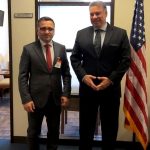20th April 2022, Skopje – Impact of the conflict in Ukraine on the global economy, as well as price and energy crisis, will be the key topics of discussion at the Spring Meetings of the World Bank Group and the International Monetary Fund, to take place this week in Washington. Delegation of North Macedonia, headed by Minister of Finance, Fatmir Besimi, and Governor of the National Bank, Anita Angelovska-Bezhoska, will take part.
During the Spring Meetings in Washington, the Minister will have several meetings with high representatives from these international financial organizations, among which the IMF Executive Director, Paul Hilbers, IMF Resident Representative, Bergljot Bjørnson Barkbu, IMF Regional Representative for the Western Balkans, Stephanie Eble, Director of the European Department at the International Monetary Fund, Alfred Kammer, as well as Executive Director at the Constituency Office at the World Bank Group, Koen Davidse, World Bank Vice President for Europe and Central Asia, Anna Bjerde, the Country Director for the Western Balkans Region of the World Bank, Linda Van Gelder, and World Bank Country Manager for North Macedonia Mr. Massimiliano Paolucci.
During the stay in Washington, Minister Besimi will also meet with US Deputy Assistant Secretary of State for European Affairs and Special Representative to the Western Balkans, Gabriel Escobar, as well as US Treasury Department representatives.
Minister of Finance will point out the key medium-term priorities of the Government aimed at achieving sustainable growth and the reforms undertaken to that end, as well as the short-term priorities arising from the prevalent price and energy crisis, intensified with the conflict in Ukraine, and the need for possible additional support.
North Macedonia’s priorities are primarily geared towards ensuring price stability so as to maintain macroeconomic and financial stability. To that end, set of 26 anti-crisis measures has been adopted, totaling EUR 400 million, as support to the living standard of the citizens, companies’ liquidity and financial support to the companies through the Development Bank. Although the crisis forced for the needs to focus, in the short term, on responding to the price and the energy crisis, short-and long-term commitment to fiscal consolidation still remains, all to the end of reducing both the budget deficit and the public debt, as well as attaining economic growth rates which, as a result of the crises, undergo downward revision. However, it is important that they remain positive. Amid crisis like this, making thorough analyses and designing emergency respond measures are of especial importance, as well as are medium-term structural reforms, all to the end of ensuring more stable economic growth in future and create a mechanism to provide for easier overcoming of any possible future crises requiring prompt response.
For the first time after two years, 2022 Spring Meetings are held in-person, they will be conducted in a hybrid format, with Ministers of Finance, Governors of Central Banks, representatives of the business community, the NGOs and experts gathered in one place, debating on the prevalent issues of global interest, the challenges faced and the possibilities to overcome them.
















